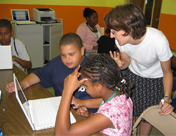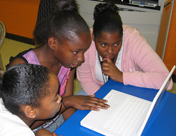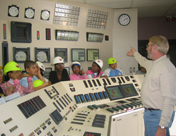GET City: Youth Exploring Energy Technologies
- Angela M. Calabrese Barton
- Professor
- Department of Teacher Education
- College of Education

Angie Calabrese Barton helps students import graphs into movie-editing software.
Lansing has been hit hard by the downturn in the automotive industry and continuing high levels of unemployment in Michigan. These problems were compounded by 2008's high cost of gas, leading some to explore possible solutions to these problems through biofuels. Others, including researchers like Angela Calabrese Barton, have been looking at these processes for years.
"We started our program one year before the gas crisis," Dr. Calabrese Barton said. "It's a focus that the state has been trying to take."

"This program has given the kids a sense of what they can do and what avenues they can reach. Angie, her husband, and the partners she's brought on board are so down to earth—they make the kids feel like they're a part of it. They're making our kids feel empowered."
Carmen Y. Turner
President and CPO Boys & Girls Club of Lansing
The program is Green Energy Technologies in the City (GET City), a collaborative effort between Angela Calabrese Barton in the College of Education, Scott Calabrese Barton in the College of Engineering, and the Boys and Girls Club of Lansing. Funded by a grant from the National Science Foundation, this year-round program serves two cohorts of 34 middle school students each and engages the students in both science issues and information technology skills.
Students have investigated potential community impacts of policies, such as the research they conducted in 2008 on a proposed (though eventually rejected) plan by Lansing Board of Water and Light for a new hybrid power plant. The students learned about biomass and discussed clean coal. "We unpacked the myths that were on TV," Calabrese Barton said. Students made 30- and 60-second public service announcements on energy conservation and presented research in public forums in Lansing.

Students in the GET City program visit the Lansing Board of Water and Light's energy efficient power plant.
More recently, the students conducted a survey for Lansing Mayor Virg Bernero's office on the Greater Lansing Go Green! initiative. They have also made podcasts on biomass, which is renewable but doesn't burn very cleanly, and were one of the few children's groups to present at the "Green Today, Jobs Tomorrow" conference, sponsored by Michigan's Department of Labor and Energy, in May 2009. This work helped the students construct identities as expert scientists and engineers, and Calabrese Barton has data to confirm that kids who never thought about science and engineering careers are now considering them. It helps, of course, that their research is being taken seriously by policy makers, including the Mayor's office. Calabrese Barton reported that "One of the students, an eleven-year-old girl, said, 'We're the make-a-difference experts.'"
The outcomes of this work are perhaps most obvious for the participants themselves, but Calabrese Barton's own research and teaching methodologies have been challenged as well. Teachers or volunteers with youth programs may operate from a specific curriculum, but, she said, "your work is always framed around what is happening with the students at the moment." With the critical ethnographies that Calabrese Barton conducts, and by working with a broad spectrum of partners as she does with GET City, she is constantly required to reframe her work—to ask herself what research questions, and what products and outcomes, might matter to a wide range of audiences. Students in GET City are asking, "How can we do something more?"
One answer is an upcoming item on the GET City agenda, which involves adapting the highly localized curriculum for Boys and Girls Clubs nationwide, and determining how to link the work the students do in GET City more directly with what they are learning in the classroom. For more information, visit getcity.org.
- Written by Lisa Eldrid, University Outreach and Engagement